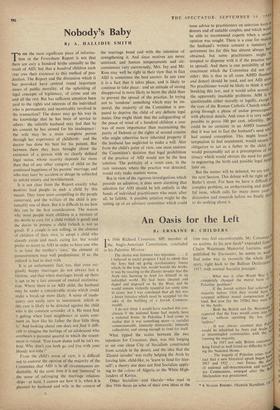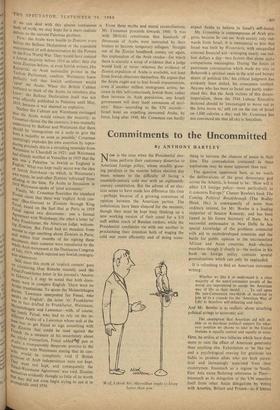An Oasis for the Left By ERSKINE B. CHILDERS I N
1946 Richard Crossman, MP, member of the Anglo-American Commission, concluded in his Palestine Mission: The choice was between two injustices . . . if I believed in social progress I had to admit that the Jews had set going revolutionary forces which, in the long run, would benefit the Arabs. It was by reacting to the Zionist invader that the Arab was learning to fend for himself in an industrial world. He had been cheated and duped and imposed on by the West, and he would remain violently resentful for some time 16 come: but I was convinced that all this was a lesser injustice which must be accepted for the sake of the building of a Jewish Common- Wealth. . . .
I do not think I would have reached this con- clusion if the national home had merely been a national home. In Palestine 1. had come to realise that it was something more—a socialist commonwealth, intensely democratic, intensely collectivist, and strong enough to fend for itself.
What tipped the scales between the two injustices for Crossman, then, was this longing to see one clean City of Socialism constructed from scratch in the desert, and the idea that the 'Zionist invader' was really helping the Arab by forcing him, child-like, to 'learn to fend for him- self; a theory one does not find Socialists apply- ing to the colons of Algeria or the White High- landers of Kenya.
Other Socialists—and liberals—who read in this 1946 thesis an echo of their own ideas at the time may feel uncomfortable. Mr. Crossman no qualms. In his new book* expanded frog' Chaim Weizmann Memorial Lectures, rece° published by Encounter, he seems to want find some way to reconcile the whole Zi01/ story, right back to the Balfour Declarat 1917, with normal Socialist precepts: . . . What was it, after World War I, completely changed the moral basis of Palestine problem? . . . If the Jewish settlers had achiev,!,I I majority before 1914 they would hav, 11, accepted without moral compunction all t' kind. But now [by the 19'20s] they werc by the Arabs. . . . Both the British and Dr. Weizmano expected that the Jews would conic into P.3 tine . . without upsetting the less eivi 'natives.' . . . It was always assumed that Patcst would be inhabited by Jews and Arabs as intermingled coMmunities with the Arl forming the majority. . . . In 1917 not only British statesmen King Feisal as well found no difficulty in a ing the National Home.
. . .
The tragedy of Palestine arisesro'"m fact that a new historical epoch began ND' 1917 and 1922 . . . two forces, the dnc of national self-determination and revolt° ary Communism, emerged after the 101‘‘ Declaration was proclaimed.
*A NATION RIIBORN. (HaMi4h liaMiliOn. 1 2s.
ion If we can deal with this almost continuous body of myth, we may hope for a more realistic debate on the current Palestine problem.
First : the Arabs were hostile to Zionism years before the Balfour Declaration or the expedient endorsement of self-determination by the Powers in the First World War. They would have resisted a Jewish majority before 1914 as after; they did resist Zionism before, aS even Jewish writers, like Kalvariski on Arab nationalist protest in the Turkish Parliament, confirm. Weizmann knew Perfectly well that Jewish settlement would upset' the Arabs. When the British Cabinet
of bothered to think of the Arabs, its members also
knew: the Balfour Declaration itself was not it even officially published in Palestine until May, 1919, because it was deemed so explosive.
Neither the Cabinet nor Weizmann envisaged
iD that the Arabs would remain the majority, as Crossman claims. On the contrary, it was mutually understood by Balfour and Weizmann that there should be 'immigration on a scale to give the Jews a majority as soon as possible.' Crossman Unwittingly explodes his own assertion by repro- ducing precisely this in a revealing reminder from Weizmann to Churchill in 1921; and Weizmann had already testified at Versailles in 1919 that the aln) was a Palestine 'as Jewish as England is Ernglish.' What was kept really secret was the idea of Jewish Statehood—to which, in Weizmann s I■11 Own words he and other Zionists 'refrained' from arti alluding n8 at the time. To Arabs in Jerusalem in i sir c18 Weizmann spoke of 'joint autonomy.'
Mr. Crossman flourishes the standard Zionist claim that there was 'explicit Arab con- sent' (Ben-Gurion) to Zionism through King F,eisal based on the fact that at Paris in 1919 signed two documents: one a formal .1:!greement with Weizmann; the other a letter `to' Felix Frankfurter, the American judge, welcom- ing Zionism. But Feisal had no mandate from anyone to sign anything about Zionism in Paris; and within four months of his signing these o vyn,cuntents, their contents were repudiated by the Whole Arab movement at the Damascus Congress or nt julY, 1919, which rejected any Jewish immigra-
ion 'ion whatsoever.
Still, since this myth of 'explicit consent' goes
•
O° Circulating (Jon Kimche recently used the v eisal-Frankfurter letter in his journal's 'Answer to Gilmour'), it may be noted that both docu- 42enls were in complex English. There were no Arabic translations. To quote Meinertzliagen °larks, 'Lawrence interpreted for Feisal, who speaks no English': the letter `to' Frankfurter Was in fact drafted by Frankfurter, Weizmann, t7einertzhagen and Lawrence—with, of course, _,°ie lonely Feisal, who had to rely on the in-
ullerent Arabic of a Lawrence whose task at the time Vas to get Feisal to sign something with
the Zionists that could be used against the tirench. As a measure of his uncertainty about .:1'e whole transaction, Feisal added itir pen in Arubic a transparently desperate proviso, to the tegreement with Weizmann stating that its con- ltS would be completely void if British 131:Ontises of Arab independence were not kept. They Were not kept, and consequently the tkeisal-Weizmann Agreement' was void. Zionists ..nernselves evidently thought so little of its worth Inat they did not even begin trying to use it in
25. Propaganda until 1936. ;•:1 From these myths and moral reconciliations, Mr. Crossman proceeds towards 1960. 'It was with [British] connivance that hundreds of thousands of Arabs were instructed by their leaders to become temporary refugees.' Straight out of the Zionist handbook comes, yet again, this explanation of the Arab exodus—for which there is scarcely a scrap of evidence that a judge would look at twice—whereas the evidence of Zionist expulsion of Arabs is available, not least from Jewish observers themselves. He argues that the Arabs ought not to fear Israeli expansionism, even if another million immigrants arrive, be- cause in this 'self-consciously Jewish State, rather than increase its Arab population, any Israeli government will deny itself extensions of terri- tory.' Since—according to the UN records-- Israel went on expelling unwanted Arabs, by force, long after 1948, Mr. Crossman can hardly expect Arabs to believe in Israel's self-denial.
Mr. Crossman is contemptuous of Arab pro- gress, because he can see Arab society only out- wards from Israel. It is immaterial to him that Israel was built by Westerners, with unequalled external financial aid—averaging nearly one mil- lion dollars a day—two factors that alone make comparisons meaningless. During 'the hours of passionate conversation which made my stay at Rehovoth a spiritual oasis in the arid and bumpy desert of political life.' his critical judgment has evidently been dulled, his conscience soothed. Anyone who has been to Israel can partly under- stand this. But the Arab victims of this dream- imperialism, those the 1944 Labour Executive declared should be 'encouraged to move out as the Jews move in,' still rot on the rim of Israel on 1,600 calories a day; and Mr. Crossman has not convinced me that all this is Socialism.



































 Previous page
Previous page